If you’ve stumbled upon this blog page, it’s likely that you’re interested in purchasing a stunning diamond. Whether you’re looking for an engagement ring or considering an upgrade to a larger diamond, navigating the process can be a bit overwhelming.
There are numerous factors to consider when making a diamond purchase. Questions may arise about the ideal size, color, and clarity of the diamond. You might wonder how the cut influences both the brilliance and price of the diamond. Additionally, you may contemplate whether it’s necessary to buy a diamond that has been lab graded or certified.
While many consumers searching for a diamond engagement ring understand the importance of purchasing from a store that offers certified diamonds, they may not fully grasp the distinctions between certified and non-certified gemstones.
So, what exactly sets certified and non-certified diamonds apart? Today, we will delve into this topic in the hopes of assisting you in making the right choice when selecting your precious gem.
Let’s dive in!
DESIGN YOUR OWN ENGAGEMENT RING: START WITH A SETTING OR START WITH A DIAMOND. IT’S REALLY UP TO YOU!
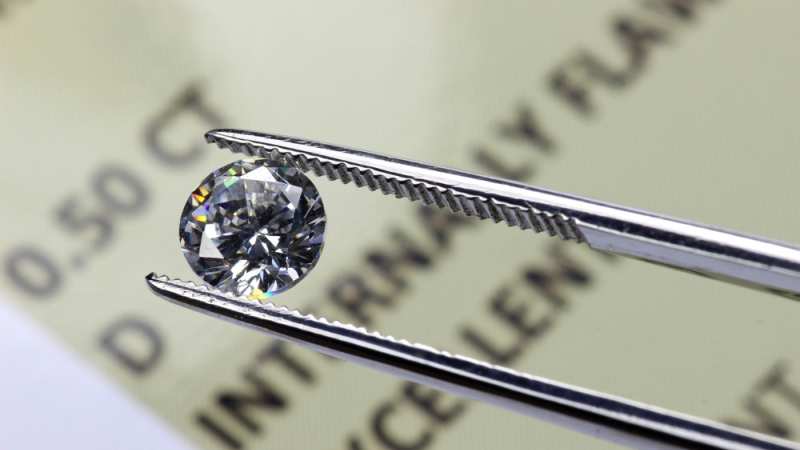
Non-Certified Diamonds Vs. Certified Diamonds: What’s The Difference?
In simple terms, certified diamonds undergo assessment and grading by an independent certifying organization. These diamonds come with a unique identification number and a certificate to validate their quality.
For added assurance, many certified diamonds are laser engraved with their identification number.
On the other hand, non-certified diamonds have not undergone inspection by a third-party certifying organization, leaving the retailer to make an estimated judgment on the diamond’s quality.
If a retailer provides information on the clarity, color, carat weight, or cut of a non-certified diamond, it is based on their best estimation.
While certified diamonds are not inherently superior to non-certified diamonds, they often represent higher-quality gems as they have been selected by the store based on their verified quality.
Furthermore, certified diamonds are frequently entirely natural and have not undergone any treatments.
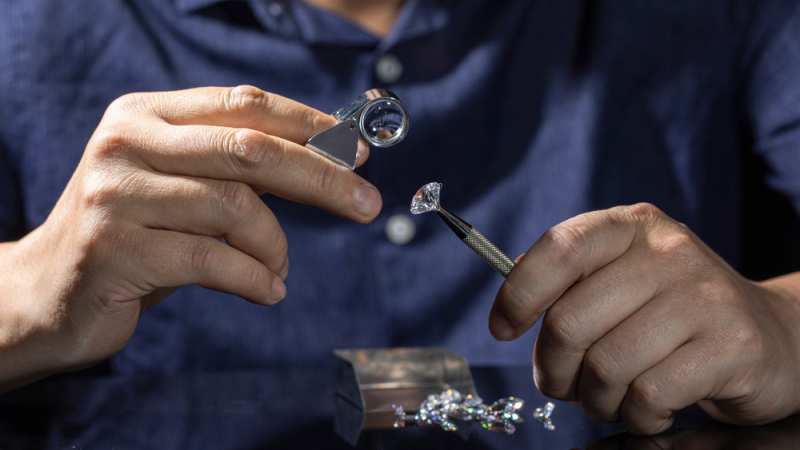
Who Exactly Certifies Diamonds?
Diamond certification is carried out by independent third-party gemological experts, which may include organizations such as:
- Gemological Institute of America (GIA)
- American Gem Society (AGS)
- International Gemological Institute (IGI)
- Hoge Raad Voor Diamant (HRD)
- European Gemological Laboratory (EGL)
It’s important to note that certification is only reliable if conducted by a third party that is not affiliated with the jeweler who sold the diamond. This ensures objectivity in the quality assessment, as the jeweler’s influence may affect the grading process.
It is crucial to understand the distinction between diamond grading reports and appraisals. A diamond grading report describes and grades the diamond based on its characteristics, while an appraisal determines the diamond’s value according to the current market prices. Additionally, a diamond certificate issued by the jeweler or vendor is not considered a valid certificate.
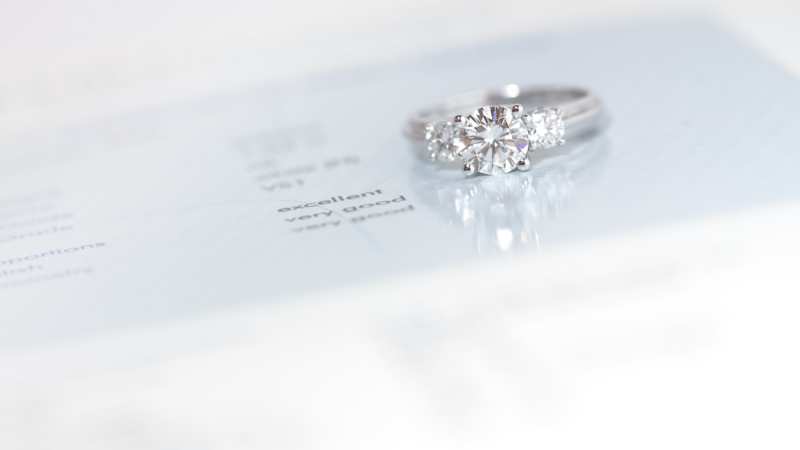
The Advantages of Buying Certified Diamonds
Choosing a certified diamond for your personalized engagement ring eliminates guesswork and provides peace of mind. With a certified gem, you can gain a deeper understanding and appreciation for diamonds.
The grading report of a certified diamond provides valuable information about its characteristics, such as color and clarity. As you become familiar with the grading criteria and compare it to your observations, you’ll develop a discerning eye. For instance, you might recognize and appreciate the absence of color in a D color diamond.
For small or decorative stones, opting for non-certified diamonds may be suitable. In such cases, it can be challenging to assess quality features with the naked eye. However, the Gemological Institute of America (GIA) does offer additional testing for loose and mounted diamonds in smaller sizes. They can perform tests to determine if these small diamonds, under .2 carats, are natural or altered.
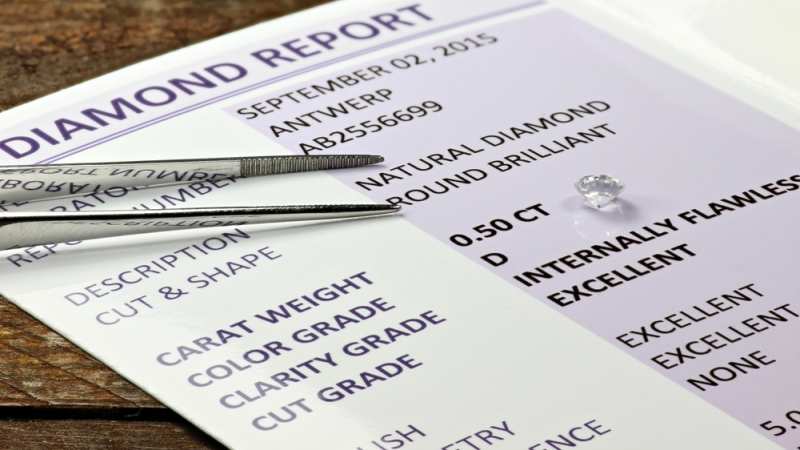
What Should You Pay Attention To In Diamond Ring Certification?
When reviewing your diamond certificate, it’s important to keep a few things in mind. Let’s go through them:
- Rating Consistency Matters: Different certifying labs may grade diamonds differently. For example, the GIA may assign different grades compared to the IGI. It’s important to understand that consistency within a specific lab is more crucial than rigidly comparing grades across labs. Look for grading consistency within the certifying entity rather than solely relying on certification ratings.
- Subjectivity of Grading: Diamond grading is subjective, and there is no centralized institution that statistically determines specific color or clarity. If a lab consistently assigns a particular grade, it is considered valid as long as they do it consistently. However, it’s essential to note that consistency alone does not guarantee reliability and trustworthiness. Avoid purchasing a diamond with a poor certificate at a high price, as it may not provide good value for your money.
- Consider the Price: Regardless of the certificate, carefully consider the diamond’s price. The price should align with the diamond’s quality, as indicated on the certificate and observed with the naked eye. If you’re unsure about the pricing, it’s advisable to have the diamond appraised by a professional before making a purchase.
- Every Lab is Different: Each laboratory has its own peculiarities and variations in grading standards. Some labs may be more lenient in color evaluation, while others may be more lenient in clarity grading. Additionally, certain labs may consistently enhance certain color ranges or favor specific inclusion patterns. Being aware of which labs are reliable and consistent can help you avoid buying a diamond that is worth less than what the certificate claims.
By considering these factors, you can make a more informed decision when evaluating a diamond certificate and selecting the right diamond for your needs.
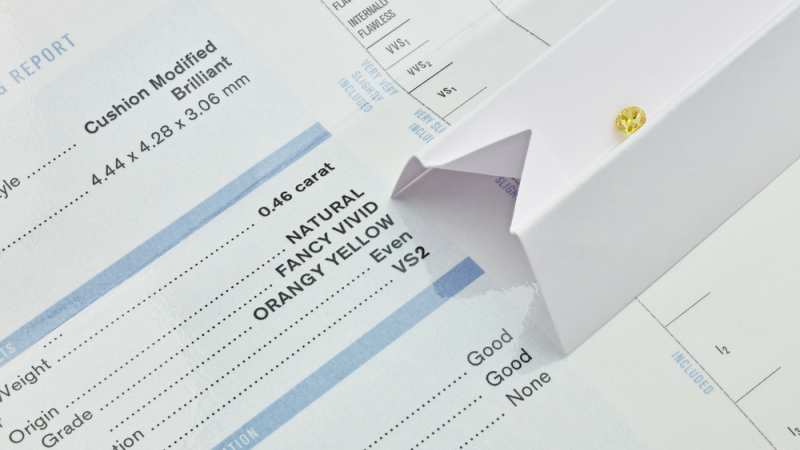
The Best Diamond Certifications
The GIA (Gemological Institute of America) and AGS (American Gem Society) are recognized as the top diamond certification institutions, known for their accuracy in grading. Their certifications provide reliable information about a diamond’s color, clarity, and cut quality. It is advisable to purchase diamonds with GIA or AGS certificates due to their outstanding reputation and consistency.
- GIA Certificate:
The GIA is a renowned and reputable diamond grading organization. Their comprehensive certification includes various attributes and aspects of the diamond, such as dimensions, weight, cut classification, color classification, clarity grade, fluorescence, and more. GIA’s grading is highly reliable, and they have no financial interest in the sale of the diamond. - AGS Certificate:
The AGS is known for introducing the diamond cut grade system before the GIA. They use a scale from 0 to 9, with 0 representing an “Excellent” cut. Although the AGS was initially dominant in the “perfect cut” market, the introduction of the GIA’s cut grade system reduced their market share. However, AGS is still favored by vendors offering flawlessly cut round diamonds.
It’s important to note that color and clarity grades are subjective, and no lab is 100% accurate in these areas. In some cases, a diamond may be submitted to different labs to seek the best possible grades. Additionally, some vendors may exploit the grading variations to enhance a diamond’s value. Despite this, AGS remains a highly reliable laboratory.
Overall, both the GIA and AGS provide reputable certifications that offer valuable information about a diamond’s quality. When purchasing a diamond, it is recommended to prioritize diamonds with GIA or AGS certificates to ensure reliability and transparency.
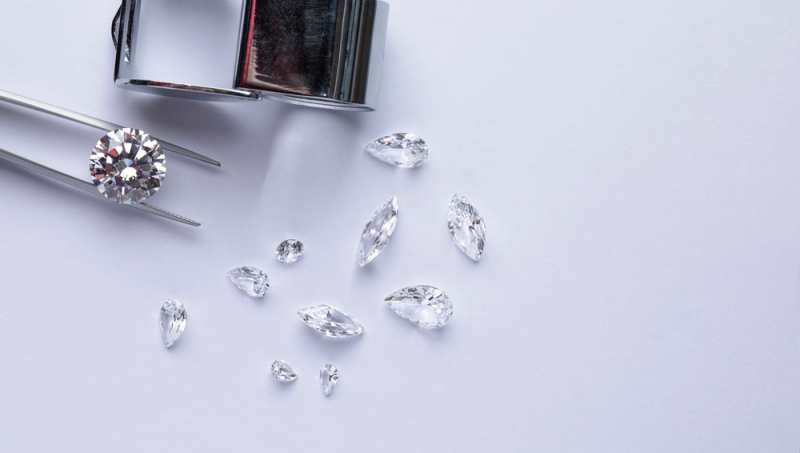
Other Diamond Certifications
- IGI Certificate:
The International Gemological Institute (IGI) has historically been utilized by large jewelry retailers but is considered more of a workhorse rather than a top-tier laboratory. While they may offer lower pricing, their grading standards are looser and less consistent compared to industry leaders like GIA. It is advisable to prioritize diamonds with independent certificates for greater assurance of quality and value. - EGL Certificate:
The European Gemological Laboratory (EGL) often inflates quality estimates in an inconsistent manner. While EGL-certified diamonds may appear cheaper, the price may not align with the actual quality of the product. Opting for a GIA-certified diamond with slightly lower color or clarity grades can ensure better quality at a lower price. It is generally recommended to avoid purchasing EGL certified diamonds. - HRD Certificate:
The Hoge Raad voor Diamant (HRD) is a European diamond grading institution that claims to be a leader in diamond grading. However, it is not widely accepted in the United States. HRD grading is often unreliable, with higher color or clarity grades compared to GIA. HRD-graded diamonds are usually more expensive, potentially benefiting diamond firms. It is advisable to prioritize GIA-graded diamonds over HRD-graded ones. - GSI Certification:
Gemological Science International (GSI) is a relatively new grading organization that has gained popularity with major diamond retail chains. However, their grading standards are looser than the gold standards set by GIA and AGSL, and even lower than the next level of labs like IGI and HRD. GSI grades are not consistent, making it less reliable. It is recommended to only purchase diamonds with GIA or AGS certifications for greater confidence in the product’s quality. Retailers may use inaccurate certifications like GSI to increase their profit rather than provide genuine bargains to customers.
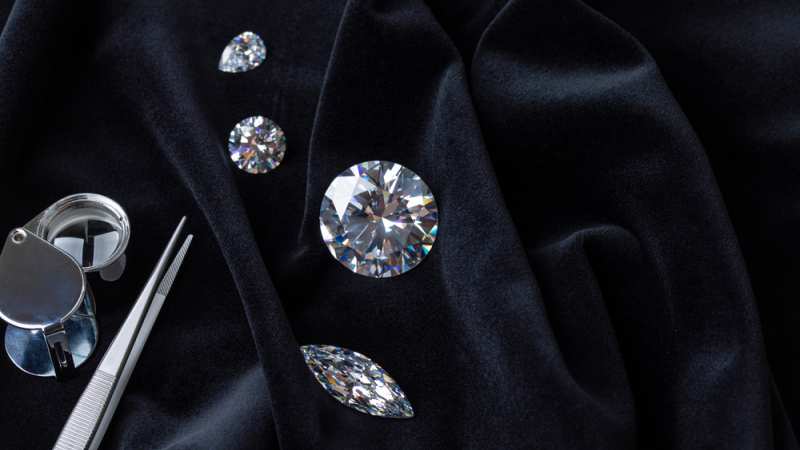
What Is The Significance Of Diamond Certification?
Diamond certification is an essential requirement when purchasing a diamond as it provides confirmation and detailed information about the gem. Without a certificate from a reputable laboratory, it is difficult to verify the accuracy of the vendor’s claims about the diamond.
A diamond certificate contains vital information such as the quality of the cut, color grade, carat weight, and other important parameters. Having proper documentation for your diamond is crucial, especially considering the significant investment involved.
Is it necessary to have a certificate for my diamond?
Absolutely! A diamond certificate is essential to ensure that you know exactly what you are getting. The certificate verifies important aspects such as carat weight, cut quality, color grade, brilliance, and more. Without a certificate, it is challenging to determine if the diamond is natural or synthetic.
Understanding the difference between diamond appraisal and diamond certificate:
Some sellers may attempt to present a diamond appraisal as a diamond certificate, but it is important to recognize the significant distinction between the two documents.
A diamond appraisal is typically provided by the seller to estimate the monetary value of the diamond for insurance purposes. On the other hand, a diamond certificate is an independent evaluation of the diamond’s quality conducted by a gemological laboratory.
It is important to recognize and appreciate this difference when assessing the credibility and reliability of the documentation provided for your diamond.
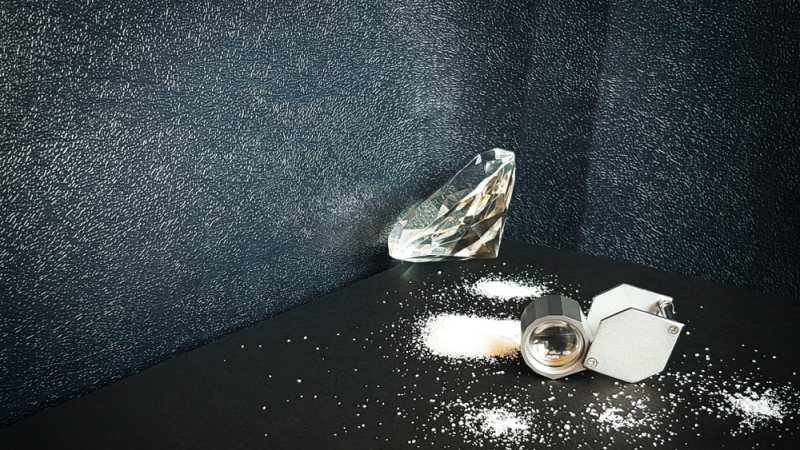
Conclusion
In conclusion, it is clear that there are significant differences between certified and non-certified diamonds, highlighting the importance of purchasing certified gems.
Certified diamonds have undergone evaluation by an independent third-party laboratory and come with a certificate verifying their attributes. This gives them a higher level of trustworthiness, as their characteristics have been confirmed by a qualified gemologist.
On the other hand, non-certified diamonds lack the assurance of an objective assessment of their color and cut quality. This makes it challenging to determine if the vendor’s claims about these aspects are accurate.
To ensure the quality and authenticity of your diamond, we strongly recommend opting for certified diamonds from reputable laboratories such as the GIA (Gemological Institute of America) and AGS (American Gem Society). By doing so, you can have confidence in the accuracy and reliability of the certified diamond’s information.


